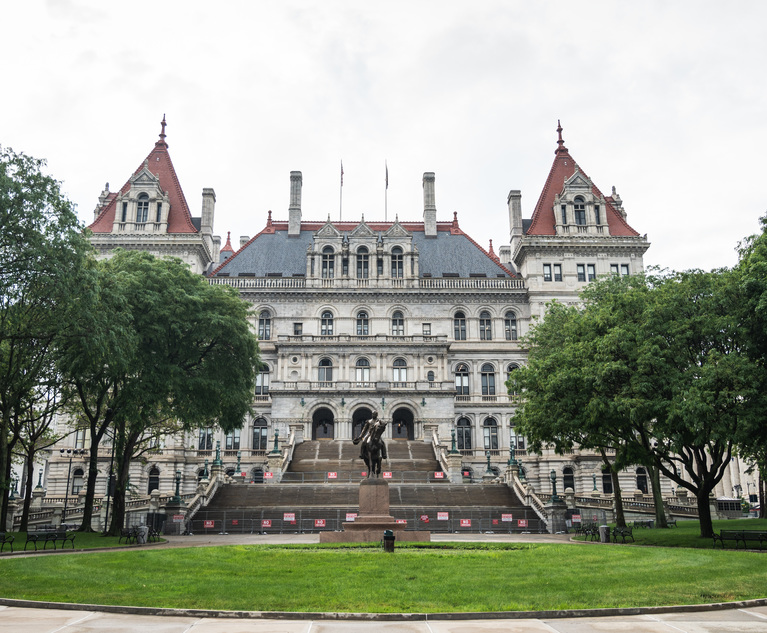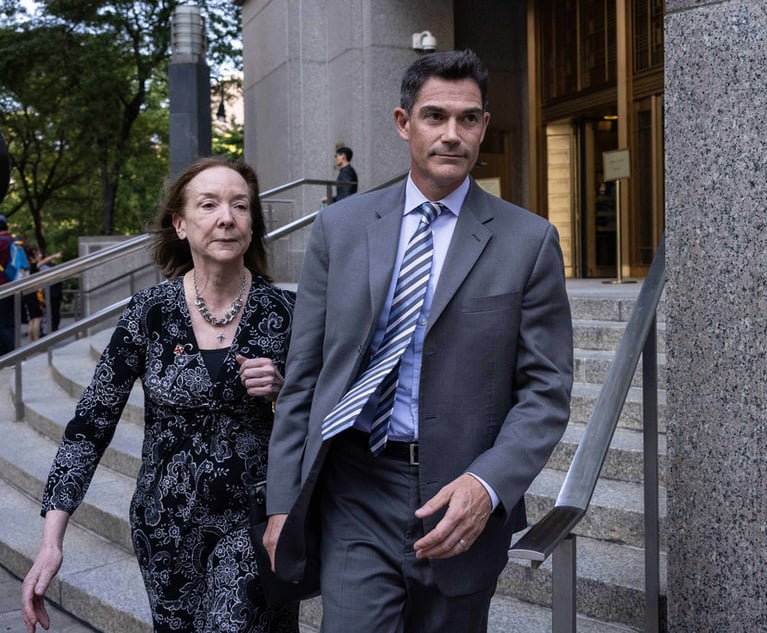 Justice Eugene Fahey
Justice Eugene FaheyBlue-Ribbon Panel Calls for Pay Bumps for NYS Commissioners, But Says No to Lawmakers, Elected Officials
The New York State Commission on Legislative, Judicial and Executive Compensation—chaired by retired New York Court of Appeals Judge Eugene Fahey—said it was too soon to give lawmakers a raise, after the most recent $32,000 per year bump.
November 14, 2024 at 05:10 PM
3 minute read
What You Need to Know
- Blue-ribbon panel says it's too soon to give the New York Legislature pay increases, after it received a $32,000 raise in 2023..
- But it granted raises to statewide agency heads, including a group of top-tier commissioners and superintendents whose pay will rise to $245,000.
- The commission had already recommended raises for state judges.
A blue-ribbon, quadrennial New York commission unanimously voted Thursday not to increase Albany lawmakers' salaries in 2025, citing a recent 29% increase to legislators’ nation-leading $142,000-a-year salaries in January 2023.
The New York State Commission on Legislative, Judicial and Executive Compensation—chaired by retired New York Court of Appeals Judge Eugene Fahey—said it was too soon to give lawmakers a raise, after the most recent $32,000 per year bump.
Likewise, the commission recommended that Gov. Kathy Hochul, whose annual salary is $250,000, and the lieutenant governor, attorney general and comptroller shouldn’t receive pay increases in 2025. Those roles were last given pay increases in January 2021, when the governor got a $25,000 raise, and the lieutenant governor, AG and comptroller got $10,000 increases, to $220,000.
The commission's final report recommends raises for state Executive Department commissioners and deputy commissioners covered under Section 169 of the New York State Budget statutory outline.
The highest-tiered commissioners, such as state Department of Financial Services Superintendent Adrienne Harris, will receive $25,000 a year increases, from $220,000 to $245,000 in 2025, with a two-percent increase in 2027.
The pay bump is to right what commissioners said was the injustice that those agency heads were sometimes earning less than unionized subordinates, and agency heads in similar roles who work for the New York City government.
For example, the state financial services watchdog’s present $220,000 annual salary is $57,604 less than New York City’s commissioner of finance, meaning, even with the looming 2025 raise, it will still be more than $32,000 less than the city counterpart's job.
Kathyrn Garcia, director of New York's operations and infrastructure, had previously testified to the commission that state commissioners and agency officials’ salaries hadn’t kept pace with the private sector, and not granting them raises put the state at risk of losing talent and its ability to attract the best candidates for these positions.
Garcia had also noted that inaction would mean the state wouldn’t have another opportunity to increase their pay until 2029.
Regarding the Legislature’s substantial pay increase in 2023, the move was accompanied by setting a $35,000 cap on the amount of outside income they may earn. But the limitation is currently being challenged in a state court.
Meanwhile, the commission had already finished its work relative to judicial compensation, when it recommended state judges receive 10.3% salary increases, their first raises since 2019. The judicial raises took effect at the start of the fiscal year in April, boosting state Supreme Court justices’ pay from $210,900 to $232,600 annually, and the chief judge’s from $240,800 to $265,600.
“This is a thankless job,” Fahey, the retired top court judge and commission chairman said in putting a wrap on the panel's work. Fahey thanked the six other members for their time traveling the state and working for more than two years to bring forward the final report.
“I believe that fair compensation for our elected officials preserves the integrity of our elected system,” Fahey said. “That fair compensation is protected when it’s led by, endorsed by, and scrutinized by the citizens of the state, and you’ve all done that.”
Fahey and fellow commissioner, attorney Helene Blank, were appointed by Chief Judge Rowan Wilson. Other legal luminaries on the panel were retired Queens Administrative Judge Jeremy S. Weinstein, an appointee of the Senate majority leader, attorney Theresa Egan, appointed by the Assembly speaker, and Victor Kovner, senior counsel to Davis Wright Tremaine, an appointee of the governor.
The commission held its meetings at the New York City Bar Association, a site that reflected the nonpartisan nature of the commission's work.
NOT FOR REPRINT
© 2025 ALM Global, LLC, All Rights Reserved. Request academic re-use from www.copyright.com. All other uses, submit a request to [email protected]. For more information visit Asset & Logo Licensing.
You Might Like
View All
COVID-19 Was Still Relevant in Securities Class Actions During 2024, Report Says
3 minute read
SEC Official Hints at More Restraint With Industry Bars, Less With Wells Meetings
4 minute read

Trending Stories
- 1Uber Files RICO Suit Against Plaintiff-Side Firms Alleging Fraudulent Injury Claims
- 2The Law Firm Disrupted: Scrutinizing the Elephant More Than the Mouse
- 3Inherent Diminished Value Damages Unavailable to 3rd-Party Claimants, Court Says
- 4Pa. Defense Firm Sued by Client Over Ex-Eagles Player's $43.5M Med Mal Win
- 5Losses Mount at Morris Manning, but Departing Ex-Chair Stays Bullish About His Old Firm's Future
Who Got The Work
J. Brugh Lower of Gibbons has entered an appearance for industrial equipment supplier Devco Corporation in a pending trademark infringement lawsuit. The suit, accusing the defendant of selling knock-off Graco products, was filed Dec. 18 in New Jersey District Court by Rivkin Radler on behalf of Graco Inc. and Graco Minnesota. The case, assigned to U.S. District Judge Zahid N. Quraishi, is 3:24-cv-11294, Graco Inc. et al v. Devco Corporation.
Who Got The Work
Rebecca Maller-Stein and Kent A. Yalowitz of Arnold & Porter Kaye Scholer have entered their appearances for Hanaco Venture Capital and its executives, Lior Prosor and David Frankel, in a pending securities lawsuit. The action, filed on Dec. 24 in New York Southern District Court by Zell, Aron & Co. on behalf of Goldeneye Advisors, accuses the defendants of negligently and fraudulently managing the plaintiff's $1 million investment. The case, assigned to U.S. District Judge Vernon S. Broderick, is 1:24-cv-09918, Goldeneye Advisors, LLC v. Hanaco Venture Capital, Ltd. et al.
Who Got The Work
Attorneys from A&O Shearman has stepped in as defense counsel for Toronto-Dominion Bank and other defendants in a pending securities class action. The suit, filed Dec. 11 in New York Southern District Court by Bleichmar Fonti & Auld, accuses the defendants of concealing the bank's 'pervasive' deficiencies in regards to its compliance with the Bank Secrecy Act and the quality of its anti-money laundering controls. The case, assigned to U.S. District Judge Arun Subramanian, is 1:24-cv-09445, Gonzalez v. The Toronto-Dominion Bank et al.
Who Got The Work
Crown Castle International, a Pennsylvania company providing shared communications infrastructure, has turned to Luke D. Wolf of Gordon Rees Scully Mansukhani to fend off a pending breach-of-contract lawsuit. The court action, filed Nov. 25 in Michigan Eastern District Court by Hooper Hathaway PC on behalf of The Town Residences LLC, accuses Crown Castle of failing to transfer approximately $30,000 in utility payments from T-Mobile in breach of a roof-top lease and assignment agreement. The case, assigned to U.S. District Judge Susan K. Declercq, is 2:24-cv-13131, The Town Residences LLC v. T-Mobile US, Inc. et al.
Who Got The Work
Wilfred P. Coronato and Daniel M. Schwartz of McCarter & English have stepped in as defense counsel to Electrolux Home Products Inc. in a pending product liability lawsuit. The court action, filed Nov. 26 in New York Eastern District Court by Poulos Lopiccolo PC and Nagel Rice LLP on behalf of David Stern, alleges that the defendant's refrigerators’ drawers and shelving repeatedly break and fall apart within months after purchase. The case, assigned to U.S. District Judge Joan M. Azrack, is 2:24-cv-08204, Stern v. Electrolux Home Products, Inc.
Featured Firms
Law Offices of Gary Martin Hays & Associates, P.C.
(470) 294-1674
Law Offices of Mark E. Salomone
(857) 444-6468
Smith & Hassler
(713) 739-1250






